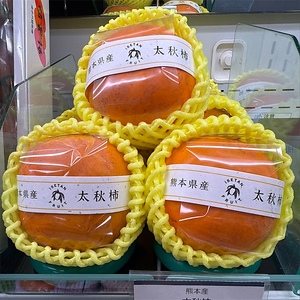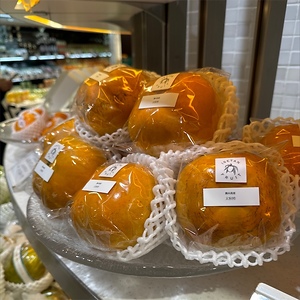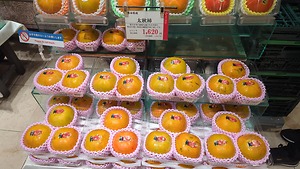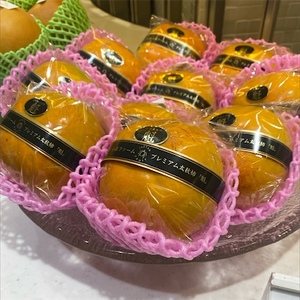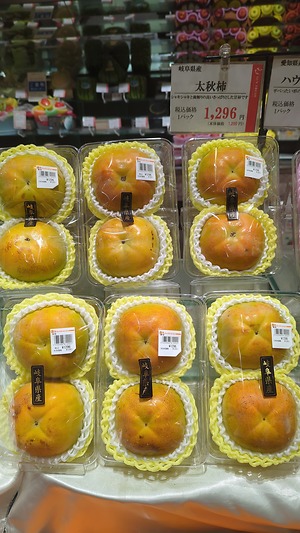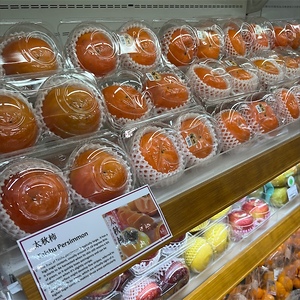

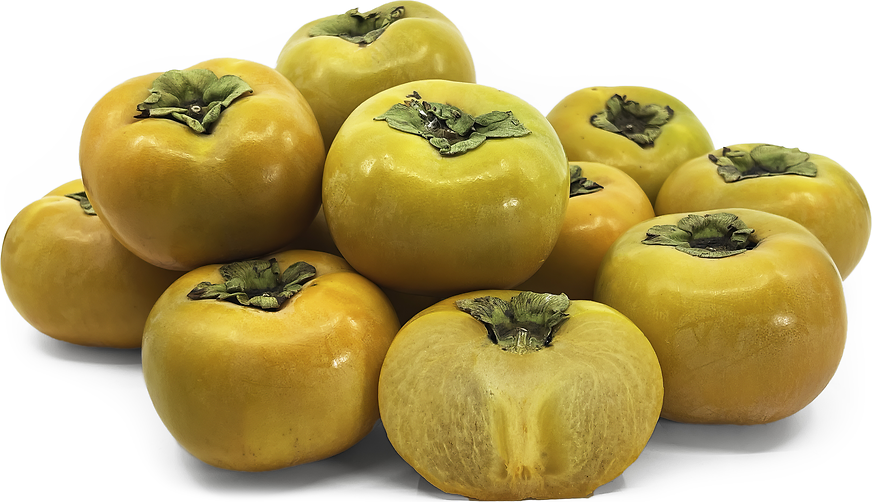
Taishu Persimmons
Estimated Inventory, lb : 0
Description/Taste
Taishu persimmons are a medium to large varietal, averaging 380 to 500 grams in weight, and have an oblate, slightly flattened shape. The fruits are generally concave at the top underneath the leaf cap and have a broad, curved middle with a narrow base. Taishu persimmons ripen from green to a muted, faint, copper-orange. The skin is semi-thick, smooth, taut, and glossy, and some fruits bear a powdery, white bloom and dark brown-black striations on the shoulders and base. These striations resemble tiny cracks and are created when the flesh has a high sugar content. Many consumers use these striations to indicate that the persimmon tastes sugary-sweet. The pale yellow to golden-orange flesh is aqueous, dense, and semi-firm with a crisp, crunchy, and succulent consistency. The variety is said to have a consistency reminiscent of a pear, and the flesh only contains 2 to 3 small seeds, sometimes found seedless. Select Taishu persimmons that feel heavy for their size, an indicator of juice content. The variety has high sugar, ranging from 17 to 18 Brix, a sugar measurement unit, creating a rich, sweet, and refreshing taste.
Seasons/Availability
Taishu persimmons are available in the mid to late fall through early winter, with a peak season in October and November.
Current Facts
Taishu persimmons, botanically classified as Diospyros kaki, are a rare Japanese variety belonging to the Ebenaceae family. The large fruits are categorized as a completely sweet persimmon, meaning the variety has low astringency and high sugar content. Taishu persimmons were introduced in the late 20th century and were selected as a commercial cultivar for their large size, sweet taste, and succulent, crunchy nature. The variety was bred to ripen earlier than Fuyu persimmons to fill a gap in the persimmon market, and Taishu persimmons have a uniquely soft and juicy but still crunchy texture, distinguishing them from other commercial persimmons. In the modern day, Taishu persimmons are grown in limited quantities and are only available for a short season. The fruits are sold as a specialty variety in Japanese markets and can be consumed in fresh or cooked preparations as a delicacy.
Nutritional Value
Taishu persimmons are a source of vitamin C to boost the immune system, vitamin A to maintain healthy organ functioning, and potassium to balance fluid levels within the body. The variety also provides fiber to regulate the digestive tract, vitamin E to reduce inflammation, magnesium to control nerve functions, phosphorus to repair tissues and cells, iron to develop the protein hemoglobin for oxygen transport through the bloodstream, calcium to build strong bones and teeth, and other nutrients, including manganese, B vitamins, and vitamin K. In Traditional Chinese Medicine, persimmons are viewed as containing cold yin energy, helping to expel heat in the body. The fruits are also used in natural remedies to improve complexion, promote heart health, and lessen the severity of hangovers.
Applications
Taishu persimmons have a rich, sweet taste suited for fresh and cooked preparations. The variety is typically consumed out of hand, enjoyed for its juicy and crunchy consistency, and is sliced into wedges, peeled, and then eaten. Taishu persimmons can also be sliced into salads, especially shiraae and namasu, which are popular salads in Japan, served on charcuterie boards, or mixed into fruit dishes. In addition to fresh preparations, Taishu persimmons are commonly simmered into jams and jellies as they contain pectin, a natural compound found in the flesh that creates a solidifying effect to create consistency in the jams. Taishu persimmons are also baked into bread, crumbles, and pies and cooked into puddings as a sweet dessert. Taishu persimmons pair well with vanilla, heavy cream, maple syrup, brown sugar, bourbon, spices such as cinnamon, cloves, nutmeg, and ginger, and nuts including almonds, walnuts, and pecans. Whole, unwashed Taishu persimmons should be wrapped in newspaper to reduce moisture and stored in a plastic bag in a cool, dry, and dark place. The variety will keep for 2 to 3 days at room temperature, depending on storage conditions, or placed in the refrigerator’s crisper drawer for up to one week.
Ethnic/Cultural Info
In Japan, an old saying mentions, “When a persimmon turns red, doctors turn blue.” This phrase was derived from the belief that persimmons are high in nutrients and are an advantageous addition to fall diets for overall health. Persimmons are especially high in vitamin C, and it is often thought that vitamin C helps to strengthen the immune system, protecting against common illnesses in the fall and winter. Fall weather is also considered ideal in Japan, leading fewer people to require the care of doctors, slowing business. Beyond colloquial sayings, Taishu persimmons are labeled as “Sakigake” or “Premium Taishu Sakigake” in Isetan, a department store in Japan known for its luxury produce. Persimmons are a favored fall seasonal gift throughout Japan, and Taishu persimmons are a popular variety for their large size and unusual dense, juicy, and crisp texture. In Isetan, Taishu persimmons sold under the “Premium Taishu Sakigake” brand name are very sweet and ready to eat.
Geography/History
Taishu persimmons are native to Japan and were developed in the late 20th century. The variety was traditionally bred in 1977 from a cross between Fuyu and II iG-16 persimmons, a variety created from crossing Okitsu No. 15 and Jiro persimmons, by the National Agriculture and Food Research Organization, or NARO, at the Akitsu Branch of the Fruit Tree Experiment Station. In 1978, the seeds were planted and cultivated, and the seedlings first fruited in 1983. Several years later, in 1989, after evaluations and trials, the new variety was named Kaki Akitsu No. 10 and was sent to public institutes for extensive testing before commercial release. The variety passed review committees in 1993 and completed registration in 1995 under the name Taishu. Today, Taishu persimmons are primarily grown in the Kumamoto Prefecture, and the Komori Farm in Uto City is known as one of the largest producers of the variety. Taishu persimmons are also cultivated in the Fukuoka, Ehime, Okayama, Shikoku, and Tokyo Prefectures.



